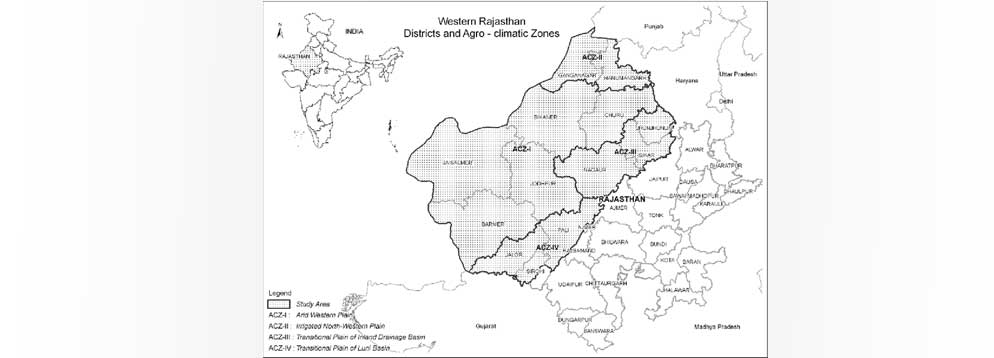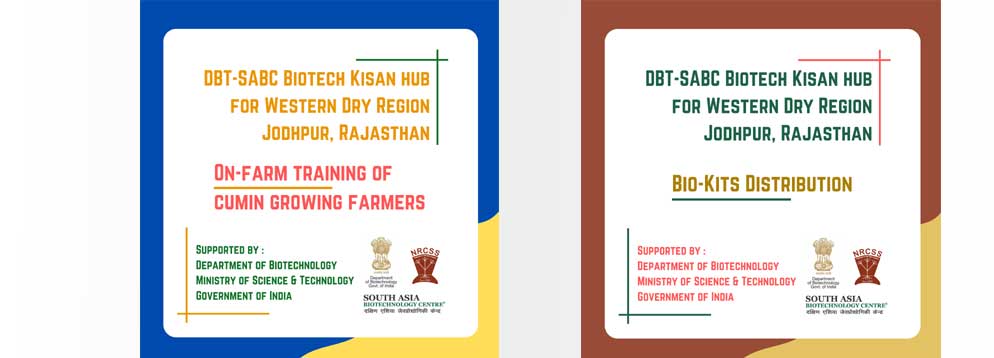Welcome to Biotech Kisan Hub for Western Dry Region, supported by Department of Biotechnology (DBT) of the Ministry of Science and Technology of Government of India and implemented jointly by South Asia Biotechnology Centre (SABC), Jodhpur and ICAR-National Research Centre on Seed Spices (NRCSS), Ajmer. Biotech KISAN acronyms “Krishi Innovation Science Application Network” aims at supporting applications of R&D, technology and innovation to help smallholders to adopt good agricultural practices (GAP) and integrated pest management (IPM) in priority crops in Western Rajasthan.

The Western dry region is one of the fifteen agro-climatic regions categorized by erstwhile the Planning Commission of India- now called the NITI Aayog based on the agro-climatic situations, physical attributes and socio-economic conditions for micro-level agricultural planning and development. Each region is characterized by soil types, rainfall, temperature and water availability, which is suitable for growing a certain range of crops to meet the food, feed, fiber and fuel requirement.
DBT’s Biotech Kisan Hub for Western Dry Region shall cover area under zone XIV which extends over Rajasthan and West of the Aravallis. The western dry region embodies desert climate and spans over major geographical areas of Western Rajasthan including the districts of Jaisalmer, Barmer, Bikaner, Churu, Jodhpur, Jhunjhunu, Sikar, Nagaur, Ganganagar, Hanumangarh, Jalore, Pali and Sirohi. This region is characterized by an erratic rainfall of an annual average of less than 250 mm and temperature ranging from 28 °C to 45 °C in summer and 5 °C to 22 °C in the winter. The desert ecology of the Western dry region is suitable for a variety of crops such pearl millet, sorghum, cotton, mung bean, moth bean and sesame in Kharif season and mustard, wheat and gram in Rabi. Rearing of cattle, goat, sheep and other livestock is an integral part of the desert ecology.

Over the years, the major emphasize has been on the development of the rainwater harvesting, rejuvenation of ponds, construction of water tanks, improving the yield of horticultural and agro forestry crops, introduction of new crops such as papaya, guava and date palm and adopting agrisilvipastoral system over wastelands.
Over the year, the R&D development of field crops, horticulture corps, agro forestry and livestock has contributed enormously in shaping the agriculture landscape of the Western dry region. Not only ICAR institutions played a vital role in crop improvement and animal breeding, State Agriculture Universities (SAUs) expanded their footprints to smallholder farmers. Both Central and State government have to strengthen the institutional infrastructure, setting up of modern R&D infrastructure, expansion of KVKs and establishing of new research centres, colleges and agriculture universities.
The Department of Biotechnology (DBT) of the Government of India has set up “Biotech Kisan Hub for Western Dry Region” at Jodhpur to strengthen production, processing and export of seed spices of Western Rajasthan by laying out demonstration of GAP at farmers’ level on four selected crops (cumin, fenugreek, kasuri methi and isabgol) and development of entire value-chain in seed spices.

The Biotech Kisan Hub for Western Dry Region project is to help smallholder farmers to adopt good agricultural practices (GAP), integrated pest management (IPM) and use of biocontrol to minimize application of pesticides in seed spices including cumin, Nagauri paan methi, fenugreek and isabgol.

The Biotech Kisan Hub for Western Dry Region has established the state-of-the-art laboratory cum modern training & skill development centre at the field office of South Asia Biotechnology Centre, Jodhpur, Rajasthan. Additionally, the Biotech Kisan Hub for Western Dry Region has established institutional linkages with Central and State agencies including APEDA, Spices Board of India, SAUs, KVKs, State Department of Agriculture, Rajasthan State Agriculture Marketing Board and other not-for-profit grassroot organizations, aggregators, processers and exporters of seed spices.
